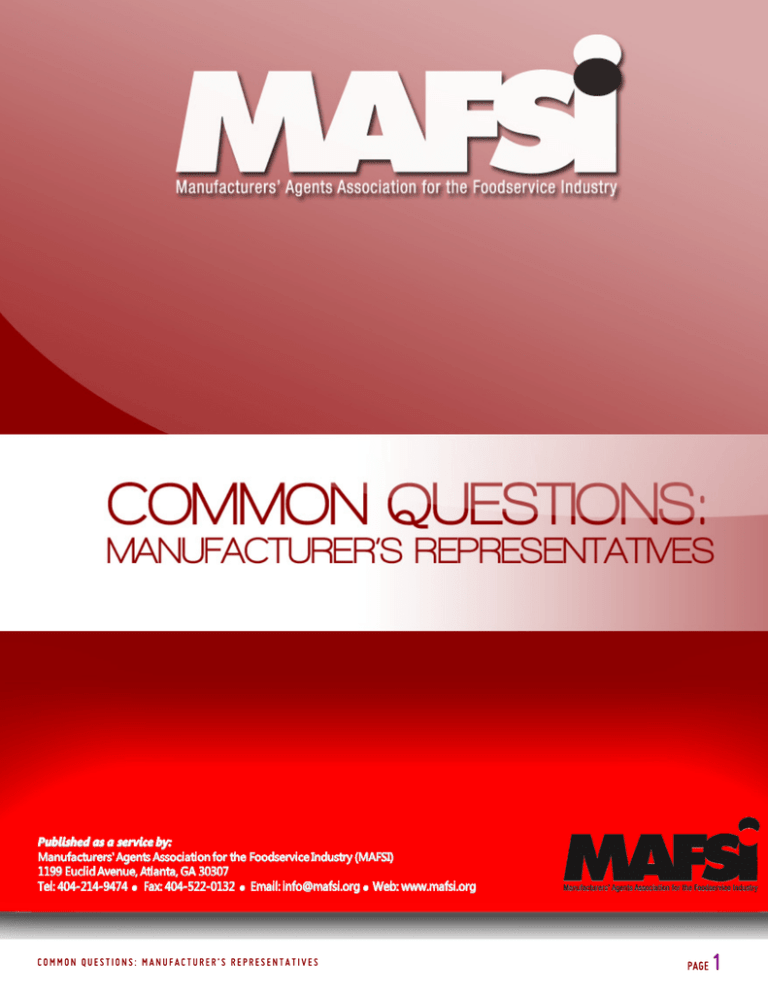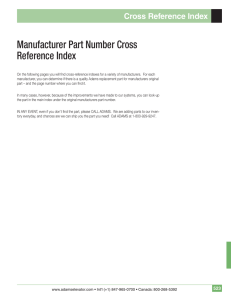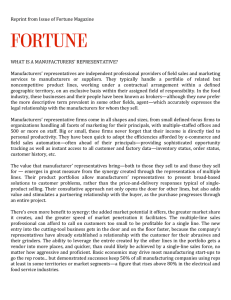common questions: manufacturer`s
advertisement

COMMON QUESTIONS: MANUFACTURER’S REPRESENTATIVES PAGE 1 Common Questions About Manufacturers’ Representatives What is a manufacturers’ representative?: A manufacturers’ representative is an independent business comprised of sales, marketing and customer service professionals acting as an independent proprietor, partnership or corporation representing two or more related but noncompetitive products in a well-defined and exclusive territory, and compensated primarily on a commission basis for goods shipped or billed from the manufacturer represented. Besides sales, what other functions does a manufacturers’ representative perform? The manufacturers' representative also supplies other valuable services such as credit reports, market research and market development information, sales analysis, new product development, customer service, demonstration, product quoting, product/sales training, and current product improvements. Additionally, representatives provide test/demo/mobile kitchens, information on restaurant and menu trends, food code authority knowledge and food preparation and safety knowledge. Why would a manufacturer use an outsourced field sales force rather than direct sales? Through multiple line selling both the effectiveness and cost-effectiveness of the basic selling function are increased. Multiple line selling creates a synergistic effect, with a broader, better defined customer base, and with more complete coverage resulting in deeper market penetration and increased sales. The manufacturers’ representative also receives only a commission, and only for their results, therefore, manufacturers who want to lower and stabilize sales expenses relative to the actual flow of orders, can turn to manufacturers' representatives to augment their sales and marketing function. Manufacturers’ representatives ultimately save the customer money because factories that market their products through outsourced field sales can operate more efficiently, which ultimately may be passed on to the customer in the form of a lower priced product. The manufacturers’ representative also saves the manufacturer and customer money by selling non-competitive lines of several factories that is synergistic in nature. In effect they reduce the cost of selling since single visits can provide sales coverage for many products and ultimately save the customer’s precious time. It is staggering to think of the cost to a manufacturer, and ultimately the cost of the product, if all 1000+ foodservice equipment, supply and furniture manufacturers in the U.S. today used a factory direct sales force to sell their products in the many different territories. How does a manufacturers’ representative get paid? Typically, the manufacturers' representative receives credit for all sales within the territory, and receives a commission for these sales through a mutually agreed upon written contract of varying length with the manufacturer. Reps are paid only after the sale is made. As part of the sales operation the representative maintains a sales and marketing business, compensates sales and administrative personnel, and assumes responsibility for all business and sales operating expenses including employee benefits, taxes, advertising, auto, travel, technology, insurance costs, office equipment, etc. A true evaluation of the alternative, a factory direct salaried salesperson, which may appear as a total cost of a $80,000-a-year can actually be closer to $160,000-185,000 when commission, employee benefits, auto, travel and expenses, holidays, and all other costs are computed. Manufacturers’ representatives also eliminate the “soft costs” of personnel (i.e. phone service) and wipe out a manufacturer’s legal exposure. Representatives pay for the costs to select, train, compensate, discipline and terminate their own employees, reducing the legal exposure of manufacturers. Today a one-to-one relationship exists between an outside sales professional and an inside support person. Does the manufacturers’ representative add cost to the ultimate price of the product? No, representatives can actually save the customer money because in many instances they may be the low cost alternative to factory direct salespeople who are compensated with more than just a commission. A representative is a form of outsourcing the sales function. Just like many companies are outsourcing their manufacturing and many of us outsource our accounting; representatives are an outsourcing of the selling department. Manufacturers’ representatives are simply a substitution for a direct sales force, nothing more, nothing less—and all manufacturers must have a sales force. A true channel intermediary is one who, like a dealer or distributor, takes title to a product, marks it up and resells it as a service. The service, which may well be an added value, is worth “x” and does add cost to the product. COMMON QUESTIONS: MANUFACTURER’S REPRESENTATIVES PAGE 2 Can manufacturers’ representatives serve as distributors? The industry currently defines distribution as a manufacturer’s product channel to the end user. The manufacturers’ representative is not part of the channel, such as a distributor, unless the manufacturers’ representative takes title of the products and resells to the customer, which may occasionally be dictated by some manufacturers. Ultimately representatives will market in the way the manufacturer deems appropriate. What are some of the advantages of selling through manufacturers' representatives? • Sale of one product can "trigger" sales of other products. Multiple line selling creates a synergistic effect, with a broader, better defined customer base, and with more complete coverage, resulting in deeper market penetration and increased sales. • Sales costs are known. Representatives are paid based on results. • Provide manufacturers immediate access to a well-educated sales team highly invested in industry programs such as CPMR, CFSP and ServSafe. • Representatives have local acceptance. They are familiar in the sales territory and trusted by the customers. They are permanent residents of their community and not transferred from territory to territory, therefore they have a more vested interest in their products and customers than factory direct salespeople do. • Provide quick response to customer problems due to representative agency location. Representatives provide the “high touch” balance through consultation on end user/customer applications, trouble shooting, specification and product assemblage. Many buyers may also feel that it is easier to get in touch with the representative if he is local, should a problem arise. • Provide local market continuity for the manufacturer and end user/customer with business and succession planning. • Provide quick entry into the market because the relationship between manufacturers' representatives and the buyer is often stronger than among company-employed salespeople because the representative knows not only those responsible for purchasing but also other decision-makers within the customer management team. • Provide more complete coverage in specific geographic areas and market because of their familiarity with manufacturing activities. Representatives are quick to identify where new products can be sold where a direct sales force, in contrast, may take months or years to acquire similar knowledge. • Provide more objective evaluation and customer feedback of new products or ideas for improving existing products as they represent more than one line and do not work for the manufacturer. • Provide information and knowledge to dealers and end users through product know-how, product training, field and test demonstrations and consultative selling. • Provide market research that cannot be provided from a mass survey or book. • Alert manufacturer to new laws or codes specific to their territory that might affect their product. COMMON QUESTIONS: MANUFACTURER’S REPRESENTATIVES PAGE 3


